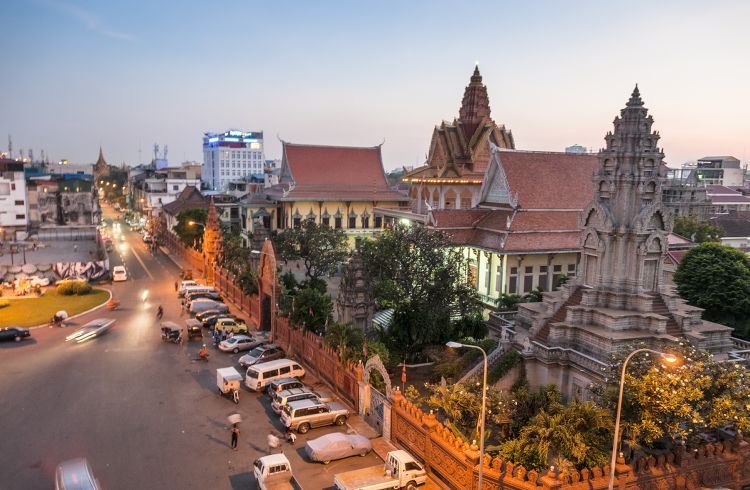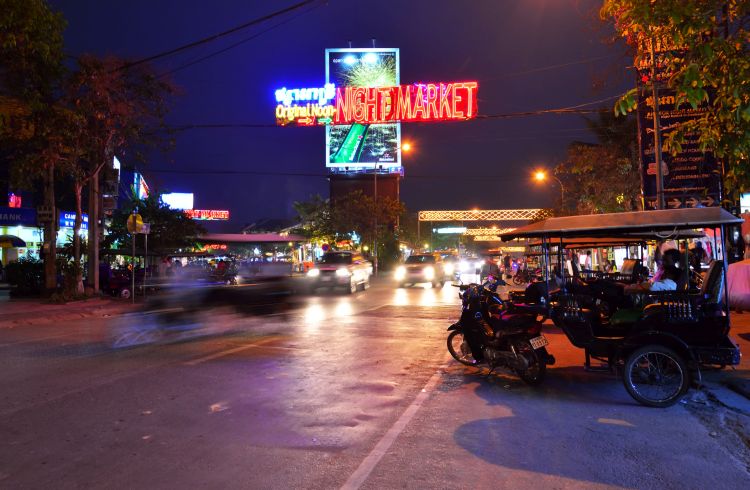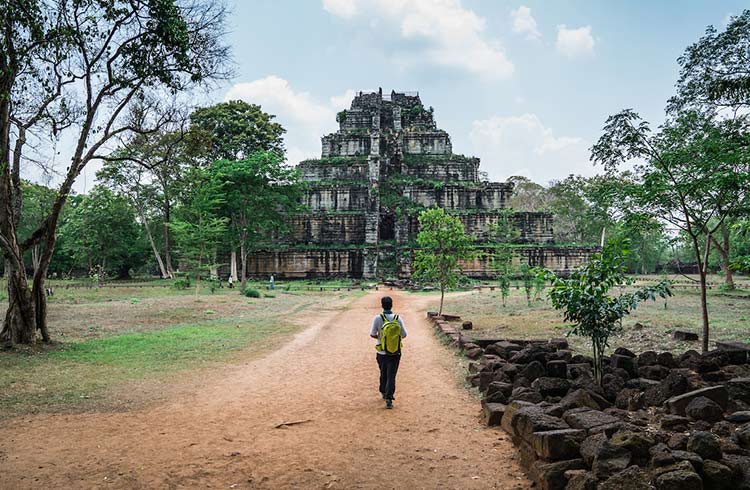Top 6 Scams to Look Out for When Traveling in Cambodia
Scammers are unfortunately all too common in Cambodia. Here are a few shady maneuvers to watch out for.
 Photo © Getty Images/tbradford
Photo © Getty Images/tbradford
Cambodia is an enchanting country with remarkable historic sites, addictive cuisine, memorable scenery, and charming people. However, it also has a problem with traveler scams. Here are a few to look out for.
- Drive by theft
- Beware overly friendly strangers
- ATM card skimming
- Fraud taxis are a problem
- Look out for fake orphanages
- Don't leave valuables in your room
Drive by theft
It has become increasingly common for criminals in Cambodian cities to commit ride-by thefts, according to local media. This issue became national news during the pandemic due to a remarkable video from the capital, Phnom Penh.
The footage showed a 26-year-old Cambodian woman crossing a busy road when she was the victim of a robbery involving not one, not two, but three motorcycles. The first rider snatched her phone from her hand. Then a second motorbike approached and its rider grabbed her handbag. Meanwhile, a third rider acted as a lookout, to aid in the getaway.
The density of traffic in this city, in particular, makes it easy for drive-by robbers to disappear into a sea of motorbikes. These criminals target phones, cameras and handbags. So, when walking on busy streets in Cambodia, tourists are advised to wear their handbags on their shoulders facing away from the road. They also should not hold their phone in their hands, unless they’re actively using it, and avoid flashing cash or jewelry in public.
Similar precautions are also necessary, where possible, when riding on the back of a motorbike taxi, or in a tuk-tuk. Motorbike thieves have been known to cruise up alongside tuk-tuks or motorbike taxis and reach over to grab belongings and speed away.
Beware overly friendly strangers
A common Cambodian travel warning issued by foreign governments is to be wary of overly friendly strangers. Across dozens of visits to Southeast Asia, I’ve lost count of the number of locals who randomly approached me outside tourist attractions and wanted to immediately strike up a friendship. The few times I accepted, it always landed me in a dodgy scenario.
When I declined their offer, commonly I’d see them make a beeline for another foreigner. The Australian Government warns that scammers regularly invite travelers to their private homes, or to join locals in a game of cards.
The former scenario often lays the groundwork for a longer-term scam, while the latter can result in the tourist losing the game and a lot of money. This cash is sometimes demanded under the threat of violence. So if a stranger in Cambodia starts a conversation with you, particularly at a famous tourist site, by all means, chat away. Just don’t follow them anywhere.
ATM card skimming
I learned the hard way that card skimming is big business. It wasn’t until I returned from a trip to Southeast Asia that I learned a large sum of money had been taken from my bank account without my knowledge. My bank investigated and traced the transaction to a location I had not visited.
I’d fallen victim to one of this region’s most profitable scams – ATM card skimming. This fraud, which is common in Cambodia, involves attaching a small device to ATMs that record card data and PIN numbers, so criminals can then steal from your bank account.
Luckily, there is an easy way to greatly reduce your chances of having your card skimmed. Avoid any ATM that looks like it would be easy for a criminal to gain unsupervised access to. For example, streetside ATMs in quiet areas, or those attached to the facades of convenience stores.
Instead, use ATMs that are surrounded by security guards or CCTV cameras such as those in a bank, a shopping center, or a large hotel. It is far more difficult for a criminal to attach a skimming device to one of these machines without getting caught.
Fraud taxis are a problem
Cambodian cities are full of vehicles offering cheap transport, from tuk-tuks to taxis, to motorcycle taxis. Many of them will not have any markings or signage, especially the tuk-tuks and motorbikes. Which means you’re getting into, or onto, an unidentified vehicle.
In the majority of cases, this will be perfectly safe. Few of these Cambodian drivers are scammers. But there are enough out there that you should avoid catching any public transport that isn’t clearly marked. Cambodian media have repeatedly reported on taxis, motorbike taxis and tuk-tuks that carry passengers into quiet areas, where they are met by robbers.
The best safeguard is to book your transport via ridesharing apps, which record the personal information of your driver. Grab and Wego are two great options.
Look out for fake orphanages
I think I wandered into this scam on my first visit to Cambodia. When my taxi driver asked if I’d like to help children living in poverty I said: “Of course”. At the Siem Reap orphanage he took me to, I witnessed what felt like an orchestrated performance. The children and staff all acted in a friendly, but very rehearsed, robotic manner.
Once I donated US $70, most of them walked away. The show was over. My experience mirrored accounts by other travelers documented in media reports on the scourge of fake orphanages in Cambodia.
A UNICEF study found thousands of the children in these facilities were not orphans and were just being used to generate income for the orphanage operators. Tourists can help by visiting the many genuine orphanages across Cambodia, which you can identify by contacting a well-known charity organization.
Don’t leave valuables lying in your room
Many hotels in Cambodia – particularly those that are three-star or higher in standard – will have an electronic safe in the room. Use it. Foreign governments, such as Australia, warn that theft from Cambodian hotel rooms is very common.
Some of these hotels also have notices that state if you don’t use the safe, and your belongings go missing, the property is not responsible. Your only recourse then, will be to contact Cambodian police. Do you really want to waste a chunk of your holiday making police reports? No, of course not. So do the obvious thing and use your hotel safe.
Related articles
Simple and flexible travel insurance
You can buy at home or while traveling, and claim online from anywhere in the world. With 150+ adventure activities covered and 24/7 emergency assistance.
Get a quote


24 Comments